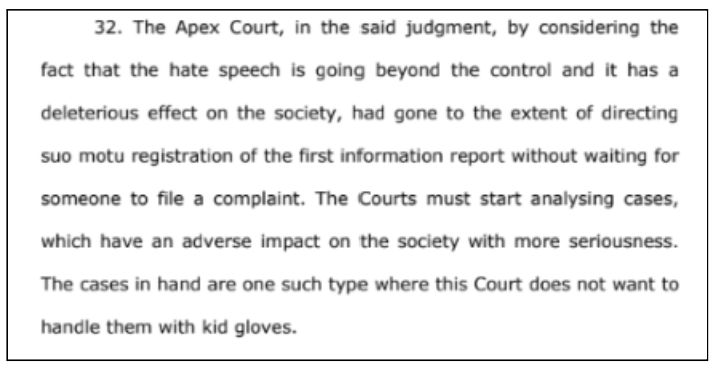In this edition of court judgements review, we look at Supreme Court’s judgement about final report in a case has no bearing on claim petitions, that regularizing employment of only some employees is discriminatory and violative of Article 14, Bombay HC’s order that age of consent and age of marriage should be distinguished as sexual acts take place not just in the confines of marriage, Delhi HC’s order that courts should refer matter to concerned board to scrutinize the claim of mental illness.
SC: Final report has no bearing on claim petitions
In the case, Mathew Alexander vs. Mohammed Shafi & another, the Appellant’s son and five others travelling in a car died in a collision with a truck. The Appellant had also sought compensation for the death of his son before the Motor Vehicle Claims Tribunal, Kollam due to the negligence of the tanker lorry driver involved in the accident. Claim petitions were filed by the respondent and other legal representatives of the deceased passengers in the car as well. According to a chargesheet regarding the FIR filed against the appellant’s son, the charges against him had abated as he lost his life in the accident. Further investigation was conducted. The final report presented by the Assistant Commissioner of Police stated that the accident was unavoidable and was not attributable to negligence on the part of the Appellant’s son.
The respondents sought quashing of the report before the Kerala High Court, which held that the accident was because of the negligence of the appellant’s son. Aggrieved by the decision, the appellant approached the Apex Court. The Supreme Court division bench of Justice B.V. Nagarathna and Justice Prashant Kumar Mishra allowed the appeal stating that the standard of proof beyond reasonable doubt cannot be applied while considering the petition seeking compensation on account of death or injury in a road traffic accident. The opinion in the final report did not have any bearing on the claim petitions.
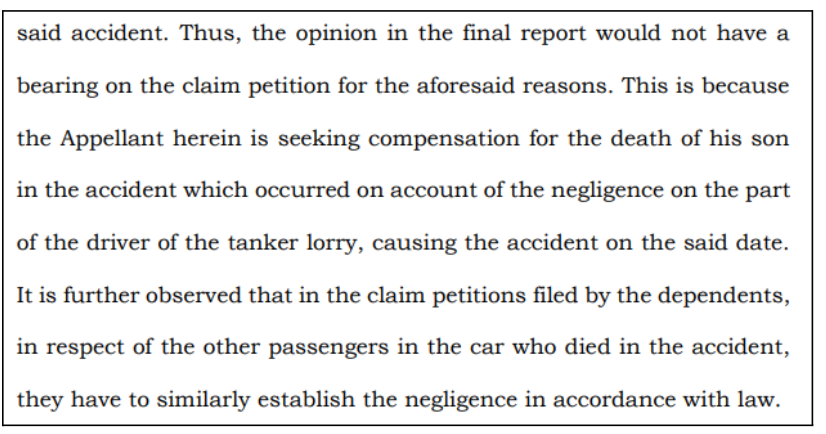
SC: Regularizing employment of only some employees is discriminatory and violative of Article 14
In Raman Kumar & Others vs. Union of India & Others, the matter before the Supreme Court was about the regularization of employees. In pursuance of the case, Secretary, State of Karnataka & Others vs. Umadevi & Others, the Chief Commissioner of Income Tax submitted a report in 2013 where it identified that only 65 employees were entitled to regularization. Further, the services of only 35 employees were regularized and of the remaining 30 employees were not, since only 35 vacancies were available. 16 persons out of the remaining 30 employees filed contempt petitions alleging that the respondents did not regularize the services of the appellants which is contempt of Court.
The Deputy Commissioner of Income Tax filed an affidavit before the High Court, stating that the services of the remaining employees could not be regularized since the posts were not available. Further, the abolition of ‘Group D’ posts was also cited as a reason why the appellants could not be regularized. The court noted that in the Umadevi case, the Court had granted a one-time measure to be conducted for regularization of the services of employees who had completed more than ten years in service and these appellants were eligible for the same.
The Supreme Court Bench of Justices B R Gavai and J B Pardiwala did not accept the submissions of the respondents observing that regularizing the employment of some and not doing that for others is patently discriminatory and violative of Article 14 of the Constitution of India. Allowing the appeal, the court directed regularization of the appellants with back wages and other benefits to be settled in six months.
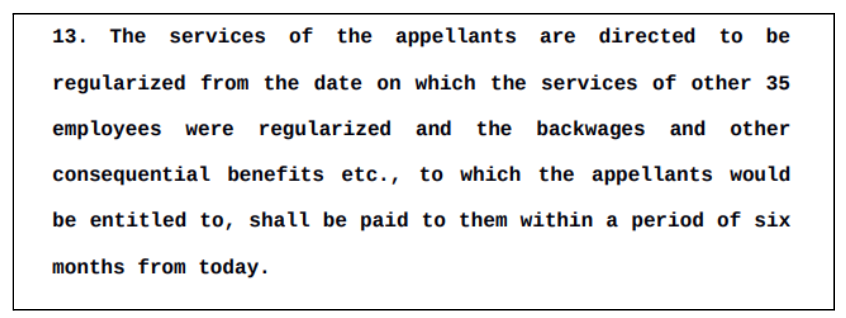
Bombay HC: Age of consent and age of marriage should be distinguished as sexual acts take place not just in the confines of marriage
In Ashik Ramjan Ansari vs. the State of Maharashtra & Another, the accused was convicted under the Protection of Children from Sexual Offences Act (POCSO Act) in 2016 for having sexual relations with a minor girl. The accused was then aged 25 years and the minor girl was 17 years old. She said that they were in a consensual relationship. The girl also stated that she was an adult under Muslim law and hence she had performed Nikah (marriage) with the accused. She had also lived with him by projecting herself to be his wife. The trial court observed that the sexual relationship between the two had taken place when the girl was only 17 years and 5-6 months old and that she was a minor because of which her consent was immaterial and accused the appellant under POCSO Act.
The Bombay High Court’s Single Bench with Justice Bharti Dangre observed that the trial court’s decision to convict the accused (appellant) was erroneous since the intercourse was consensual. Acquitting the appellant of the charges, the High Court also noted that the criminalization of romantic relationships has overburdened the criminal justice system. It is consuming the time of the judiciary, police, and child protection systems. It added that it was the duty of the state to take decisions and protect the autonomy of individuals including adolescents. Merely because of the apprehension that adolescents would make impulsive or bad decisions does not mean that their wills and wishes should be ignored. Age of consent should be distinguished from the age of marriage as sexual acts do not only happen in the confines of marriage.
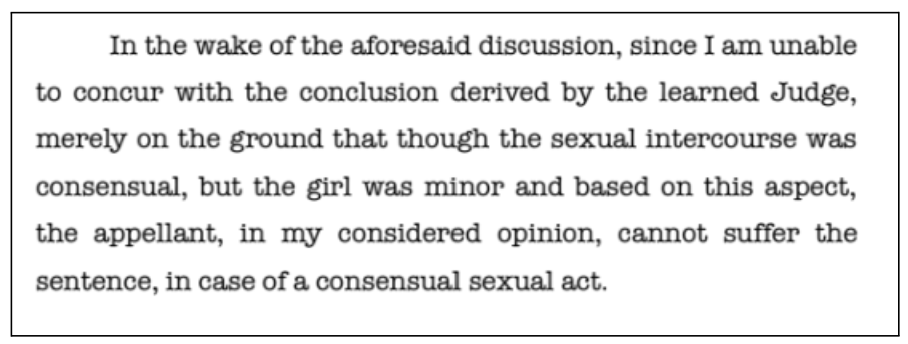
Delhi HC: Courts should refer matter to concerned board to scrutinize the claim of mental illness
The facts of the case, Ankur Abbot vs. Ekta Abbot date back to March 2022, when the Metropolitan Magistrate directed the petitioner to pay Rs 1.15 lakh per month to the respondent and their minor daughter under Section 12 of the Domestic Violence Act till final disposal. The petitioner challenged the order in the Sessions Court and the wife filed an execution petition in the Metropolitan Magistrate.
Later, in October 2022, the petitioner requested an exemption from appearing in the execution proceedings citing that he suffered from Bipolar Affective Disorder (BPAD), Generalized Anxiety Disorder (GAD), depression and anxiety; and has been under regular medical supervision as per sections 105 and 116 of the Mental Healthcare Act, 2017. However, the Metropolitan Magistrate issued arrest warrants against him. He challenged the order in the Sessions Court, which dismissed the same. He then filed a revision petition before the High Court. The respondent, his wife, claimed that the petitioner was trying to frustrate her rights by seeking an exemption.
The Single Judge Bench of Justice Amit Sharma observed that the Mental Healthcare Act, 2017 was a special law that overrides other laws in accordance with Section 120 of the said Act. Section 105 stipulates that if a party claimed mental illness during a judicial process, the Court should refer the matter to a board for further scrutiny. He noted that the reports of the mental illness of the petitioner were ignored by the courts which decided based on only a single medical document issued by the Family Physician & Gynaecologist about his acute gastroenteritis.
The Delhi High Court allowed the petition and set aside both the lower Court’s orders. It directed the petitioner to initiate appropriate proceedings in accordance with the law to assess his claimed mental illness. With respect to the maintenance of the wife and child, the court clarified that the assessment would not prejudice their legal rights.
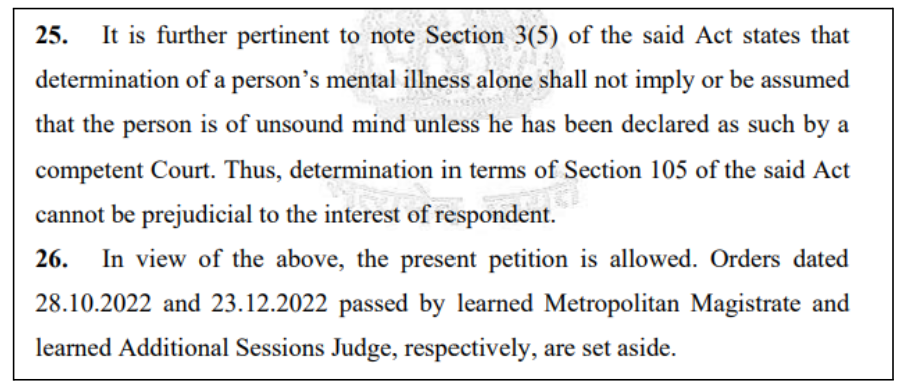
Madras HC: A person forwarding message on social media is liable for its contents
In S. Ve. Shekher vs. Al. Gopalsamy and Others, the petitioner is an actor and politician. He had forwarded an abusive, derogatory, and vulgar comment about women journalists on his Facebook account in April 2018. He stated that he had forwarded the post without going through the contents & had written an apology to the concerned woman journalist and also to the Press and Media in Tamil Nadu at large. He was charged with offences under Sections 504, 505(1)(c) and 509 of the Indian Penal Code and Section 4 of the Tamil Nadu Prohibition of Harassment of Women Act, 2002.
The Madras High Court Judge Justice Anand Venkatesh observed that the petitioner was a person of high stature with about 5000 followers. He observed that the stature of a person is directly proportional to what he communicates to society and its consequences. So, information or a message sent by a normal citizen and the same information/message sent by a person with a stature having followers has a lot of difference. Noting how quickly information spreads to every nook and corner of the world, the High Court held that people must exercise social responsibility while forwarding or creating a message. Cautioning every user of social media to be extremely careful before sending or forwarding a message to others, the Court stated that the charges on the petitioner cannot be quashed and transferred all the criminal proceedings to the Special Court.
